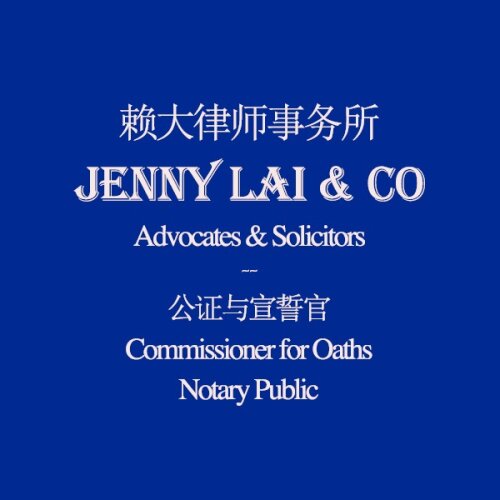Best Probate Lawyers in Chinatown
Share your needs with us, get contacted by law firms.
Free. Takes 2 min.
List of the best lawyers in Chinatown, Singapore
About Probate Law in Chinatown, Singapore
Probate law in Chinatown, Singapore deals with the legal process that occurs after a person's death, particularly, concerning the distribution of their assets and payment of their debts. This process begins when the Executor or Administrator, as named in the deceased's will, applies to the courts for probate. Once probate is granted, the Executor can legally distribute the deceased's assets as per the will. While largely the same as the rest of the country, Chinatown's multicultural community might feature unique probate cases influenced by diverse cultural beliefs.
Why You May Need a Lawyer
Probate in Chinatown can be complex due to multicultural issues. Inheritance disputes, will challenges, or large and complex estates also complicate probate application. Specialized lawyers can guide you through these complexities like validating the will, navigating legislation for inheritance tax, and settling any disputes. If the deceased died intestate (without a will), lawyers are indispensable in legally determining the rightful heirs conforming to Singapore's laws of intestacy.
Local Laws Overview
Probate in Chinatown adheres to Singapore's two main statutes: The Probate and Administration Act for grant and management issues, and the Wills Act for the creation of wills. Probate is generally not required for estates with less than $50,000. For intestacy, the Intestate Succession Act outlines the distribution of assets. However, it doesn't apply to Muslims; their property is distributed according to Muslim law, making probate in Chinatown quite nuanced.
Frequently Asked Questions
1. Can I manage probate matters without a lawyer in Chinatown, Singapore?
Yes, but it might get challenging if you are unfamiliar with Chinatown's unique multicultural landscape or the legal process. A lawyer ensures the correct implementation of the probate procedure and settlement of disputes.
2. How long does the probate process take in Chinatown, Singapore?
On average, it takes around six to nine months. However, if disputes arise, the process can lengthen to years.
3. What is the effect of probate?
Probate provides the executor with the legal authority to deal with the deceased's estate as per his/her will or per the laws of intestacy if there's no will.
4. What do I do if there's a dispute regarding the will?
If any party challenges a will, it's best to seek legal counsel to protect your rights and interests.
5. What happens if the deceased did not have a will?
In such cases, the laws of intestacy apply, with the deceased's estate distributed amongst the next of kin as specified by these laws.
Additional Resources
For more information, you can refer to the Singapore Statutes Online or the Ministry of Law's website. Also, ethnic community centers in Chinatown may offer guidance catered to the area's multicultural probate needs.
Next Steps
If you require legal help, make an appointment with a lawyer specializing in probate laws, preferably one with experience in multicultural probate issues like those in Chinatown. Prepare a list of your concerns and bring any relevant documents to get the most out of your consultation.
Lawzana helps you find the best lawyers and law firms in Chinatown through a curated and pre-screened list of qualified legal professionals. Our platform offers rankings and detailed profiles of attorneys and law firms, allowing you to compare based on practice areas, including Probate, experience, and client feedback.
Each profile includes a description of the firm's areas of practice, client reviews, team members and partners, year of establishment, spoken languages, office locations, contact information, social media presence, and any published articles or resources. Most firms on our platform speak English and are experienced in both local and international legal matters.
Get a quote from top-rated law firms in Chinatown, Singapore — quickly, securely, and without unnecessary hassle.
Disclaimer:
The information provided on this page is for general informational purposes only and does not constitute legal advice. While we strive to ensure the accuracy and relevance of the content, legal information may change over time, and interpretations of the law can vary. You should always consult with a qualified legal professional for advice specific to your situation.
We disclaim all liability for actions taken or not taken based on the content of this page. If you believe any information is incorrect or outdated, please contact us, and we will review and update it where appropriate.









